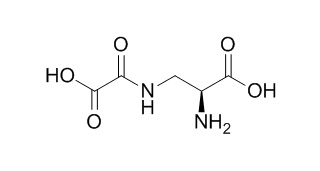Dencichine
Dencichine is a neurotoxic agent, it is also a haemostatic agent, the hemostatic effect relates to modulation of coagulation system, platelet aggregation and fibrinolytic system. Dencichine has renoprotective effect, it could significantly prevent the progression of diabetic nephropathy possibly attribute to down-regulation of the TGF-β/Smad pathway and rebalance the deposition and degradation of ECM proteins.
Inquire / Order:
manager@chemfaces.com
Technical Inquiries:
service@chemfaces.com
Tel:
+86-27-84237783
Fax:
+86-27-84254680
Address:
1 Building, No. 83, CheCheng Rd., Wuhan Economic and Technological Development Zone, Wuhan, Hubei 430056, PRC
Providing storage is as stated on the product vial and the vial is kept tightly sealed, the product can be stored for up to
24 months(2-8C).
Wherever possible, you should prepare and use solutions on the same day. However, if you need to make up stock solutions in advance, we recommend that you store the solution as aliquots in tightly sealed vials at -20C. Generally, these will be useable for up to two weeks. Before use, and prior to opening the vial we recommend that you allow your product to equilibrate to room temperature for at least 1 hour.
Need more advice on solubility, usage and handling? Please email to: service@chemfaces.com
The packaging of the product may have turned upside down during transportation, resulting in the natural compounds adhering to the neck or cap of the vial. take the vial out of its packaging and gently shake to let the compounds fall to the bottom of the vial. for liquid products, centrifuge at 200-500 RPM to gather the liquid at the bottom of the vial. try to avoid loss or contamination during handling.
Environ Toxicol.2023, 23929.
J Traditional Thai Medical Res.2022, 8(1):pp1-14.
Naunyn Schmiedebergs Arch Pharmacol.2024, 03148-x.
Genes Genomics.2020, 10.1007
Biomolecules.2021, 11(10):1537.
Chem Biol Interact.2022, 368:110248.
Korean Herb. Med. Inf.2021, 9(2):231-239.
Chem Biol Interact.2018, 283:59-74
Agronomy2020, 10(3),388.
J Chromatogr B Analyt Technol Biomed Life Sci.2019, 1113:1-13
Related and Featured Products
J Pharm Biomed Anal. 2007 Feb 19;43(3):920-5.
Analysis of dencichine in Panax notoginseng by gas chromatography-mass spectrometry with ethyl chloroformate derivatization.[Pubmed:
17029672 ]
Dencichine (beta-N-oxalyl-l-alpha,beta-diaminopropionic acid) is a haemostatic agent present in well-known traditional Chinese medicinal herbs such as Panax notoginseng, as well as other Panax species. It is also a reported neurotoxic agent found in Lathyrus sativus (grass pea seed) and cycad seeds.
METHODS AND RESULTS:
A method was developed for quantitative determination of the non-protein amino acid, Dencichine, in plant samples of P. notoginseng and the adventitious roots directly from the explants of P. notoginseng after derivatization with ethyl chloroformate (ECF) by gas chromatography-mass spectrometry (GC-MS). l-2-chlorophenylalanine was used as an internal standard. Calibration curves were linear (r(2)=0.9988, n=6) in the range of 10-800 microg/ml for Dencichine. Limit of detection and quantification for Dencichine were 0.5 microg/ml and 2 microg/ml, respectively.
CONCLUSIONS:
This rapid and specific method may be applied to the quantification of Dencichine in complex medicinal plants and their products.
Chinese Journal of New Drugs, 2014, 23(3):356-359.
Effect of dencichine on coagulation and the hemostatic mechanism.[Reference:
WebLink]
To investigate hemostatic mechanism of the effect of Dencichine on coagulation, including the effect on coagulation system, platelet aggregation and fibrinolytic system.
METHODS AND RESULTS:
Adult SD rats (n=60) and Kunming mice (n=60) were randomly divided into groups, and treated with etamsylate injection, and Dencichine DE I (40 mg·kg-1), DE II (20 mg·kg-1), DE III (10 mg·kg-1) and DE IV (5 mg·kg-1). Changes in coagulation system, platelet aggregation and fibrinolytic system were determined. Compare to control, Dencichine shortened the clotting time in mice (P<0.01), and changed factors of coagulation system (P<0.05), platelet aggregation and fibrinolytic system (P<0.01) in rats.
CONCLUSIONS:
The hemostatic effect of Dencichine relates to modulation of coagulation system, platelet aggregation and fibrinolytic system.
Eur J Pharmacol. 2017 Oct 5;812:196-205.
Dencichine ameliorates kidney injury in induced type II diabetic nephropathy via the TGF-β/Smad signalling pathway.[Pubmed:
28633927]
Diabetic nephropathy (DN), a common complication associated with both type I and type II diabetes mellitus (DM), is a major cause of chronic nephropathy and a common cause of end-stage renal diseases (ESRD) throughout the world. This study is aimed to determine whether Dencichine (De) can ameliorate renal damage in high-glucose-and-fat diet combined STZ (streptozocin) induced DN in type II DM rats and to investigate the potential underlying mechanisms.
METHODS AND RESULTS:
Markers of metabolism, diabetes, and renal function, and levels of extracellular matrix (ECM) collagen I (Col I), collagen IV (Col IV), fibronectin (FN) and laminin (LN), and of proteins in the TGF-β/Smad pathway were analysed through RT-PCR, western blot, immunofluorescence and immunohistochemistry. The results show that De significantly alleviates metabolism disorder, improved renal function, relieved pathological alterations in the glomerulus of DN rats, decreased ECM deposition and increased the ratio of matrix metalloproteinase (MMP)-9 to tissue inhibitor of metalloproteinase (TIMP)-1 both in vivo and in vitro. Moreover, De negatively regulated TGF-β/Smad signalling pathway and increased the expression of Smad7, an endogenic inhibitory Smad located downstream of the signalling pathway.
CONCLUSIONS:
In conclusion, we provide experimental evidence indicating that the renoprotective effect of De could significantly prevent the progression of DN possibly attribute to down-regulation of the TGF-β/Smad pathway and rebalance the deposition and degradation of ECM proteins.



